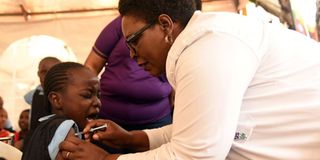Covid-19 deals blow to HPV vaccine campaigns

A healthcare worker administers the cervical cancer vaccine to Mwajuma Jillo at Hola Referral Hospital.
As Kenya battles the Covid-19 pandemic, concern is rising about the low number of girls getting vaccinated against cervical cancer.
More than 400,000 girls missed out on the first phase of the exercise that targeted 800,000 girls aged 10, records show. “Out of the 800,000 girls targeted to be vaccinated within one year of introduction, 359,000 have so far been reached,” said Health Director-General Patrick Amoth in an HPV vaccine status brief.
Last year, the government kicked off the cervical cancer immunisation programme, which was to see 800,000 girls aged 10 receive two doses of the vaccine.
Since the Covid-19 pandemic forced the shutting of schools, the programme has failed to meet its target. Failure to visit hospitals for fear of contracting Covid-19 has also affected the drive.
Dr Amoth, however, told the public that the services were still being provided. “Approximately 9,000 private, public and faith-based health facilities are offering the HPV vaccine free of charge in coordination with 35,000 primary schools,” Dr Amoth told HealthyNation.
“The public response has been immense, with high demand for the vaccine. However, fewer girls were reached during the school holidays in December. The Covid-19 pandemic has further compounded this situation,” he said.
SERIOUS SHORTAGE
Dr Amoth, who also serves on the World Health Organization’s board as executive vice president, attributed the slowdown in vaccination to the closure of schools to protect learners from Covid-19.
He added that restrictions announced by the government on the number of people allowed to meet had also affected efforts to carry out mass vaccination campaigns.
The director-general, however, confirmed that the ministry was working with county governments and other partners in a bid to ensure the services were still delivered to residents. “There are no serious shortages reported across the country since introduction. The country has adequate stocks of HPV vaccines to last a year. No stock-outs have been reported at any level,” he said.
Ms Brenda Kithaka, who heads the Women4Cancer Early Detection & Treatment advocacy and cancer care group, said the cancer management programme stood the risk of being underfunded and slowing down if the pandemic was not controlled on time.
“We are concerned that the pandemic will have an adverse long-term effect on the cervical cancer management programme in the country, particularly if the cases continue to increase, forcing the government to allocate more health funding to control the spread,” said Ms Kithaka.



